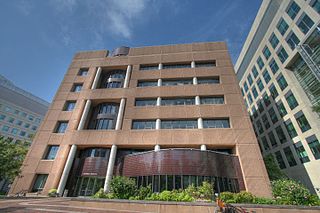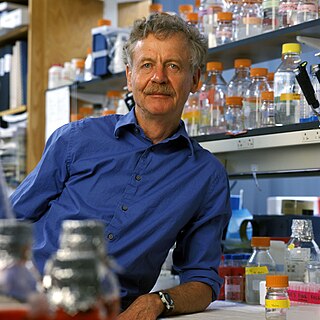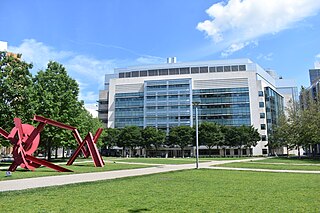Related Research Articles

David Baltimore is an American biologist, university administrator, and 1975 Nobel laureate in Physiology or Medicine. He is a professor of biology at the California Institute of Technology (Caltech), where he served as president from 1997 to 2006. He founded the Whitehead Institute and directed it from 1982 to 1990. In 2008, he served as president of the American Association for the Advancement of Science.

Whitehead Institute for Biomedical Research is a non-profit research institute located in Cambridge, Massachusetts, United States that is dedicated to improving human health through basic biomedical research. It was founded as a fiscally independent entity from the Massachusetts Institute of Technology (MIT), where its 19 members all hold faculty appointments in the MIT Department of Biology or the MIT Department of Bioengineering. As of 2023, Ruth Lehmann is its director; she succeeded David C. Page.

Small interfering RNA (siRNA), sometimes known as short interfering RNA or silencing RNA, is a class of double-stranded RNA at first non-coding RNA molecules, typically 20–24 base pairs in length, similar to miRNA, and operating within the RNA interference (RNAi) pathway. It interferes with the expression of specific genes with complementary nucleotide sequences by degrading mRNA after transcription, preventing translation. It was discovered in 1998, by Andrew Fire at Carnegie Institution for Science in Washington DC and Craig Mello at University of Massachusetts in Worcester.

Phillip Allen Sharp is an American geneticist and molecular biologist who co-discovered RNA splicing. He shared the 1993 Nobel Prize in Physiology or Medicine with Richard J. Roberts for "the discovery that genes in eukaryotes are not contiguous strings but contain introns, and that the splicing of messenger RNA to delete those introns can occur in different ways, yielding different proteins from the same DNA sequence". He has been selected to receive the 2015 Othmer Gold Medal.
Tom Maniatis, is an American professor of molecular and cellular biology. He is a professor at Columbia University, and serves as the Scientific Director and CEO of the New York Genome Center.
Norton David Zinder was an American biologist famous for his discovery of genetic transduction. Zinder was born in New York City, received his A.B. from Columbia University in 1947, Ph.D. from the University of Wisconsin–Madison in 1952, and became a member of the National Academy of Sciences in 1969. He led a lab at Rockefeller University until shortly before his death.

Rudolf Jaenisch is a Professor of Biology at MIT and a founding member of the Whitehead Institute for Biomedical Research. He is a pioneer of transgenic science, in which an animal’s genetic makeup is altered. Jaenisch has focused on creating genetically modified mice to study cancer, epigenetic reprogramming and neurological diseases.

The Koch Institute for Integrative Cancer Research at MIT is a cancer research center affiliated with the Massachusetts Institute of Technology (MIT) located in Cambridge, Massachusetts, United States. The institute is one of seven National Cancer Institute-designated basic laboratory cancer centers in the United States.
Tyler Jacks is a David H. Koch Professor of Biology at the Massachusetts Institute of Technology (MIT), a long-time HHMI investigator, and Founding Director of the David H. Koch Institute for Integrative Cancer Research, which brings together biologists and engineers to improve detection, diagnosis, and treatment of cancer. Dr. Jacks is a member of the board of directors of Thermo Fisher Scientific and Amgen, two of the major biotechnology corporations in the world. He is the President of Break Through Cancer and a member of the Board of Overseers, the larger of two governing boards of Harvard University.

Harvey Franklin Lodish is a molecular and cell biologist, professor at the Massachusetts Institute of Technology (MIT), Founding Member of the Whitehead Institute for Biomedical Research, and lead author of the textbook Molecular Cell Biology. Lodish's research focused on cell surface proteins and other important areas at the interface between molecular cell biology and medicine.

Nancy Wexler FRCP is an American geneticist and the Higgins Professor of Neuropsychology in the Departments of Neurology and Psychiatry of the Columbia University College of Physicians and Surgeons, best known for her involvement in the discovery of the location of the gene that causes Huntington's disease. She earned a Ph.D. in clinical psychology but instead chose to work in the field of genetics.
Richard C. Mulligan is an American scientist who is the Mallinckrodt Professor of Genetics at Harvard Medical School, the Director of the Harvard Gene Therapy Initiative and a visiting scientist at the Koch Institute for Integrative Cancer Research at the Massachusetts Institute of Technology. He is also the head of SanaX at Sana Biotechnology.

Richard M. Myers is an American geneticist and biochemist known for his work on the Human Genome Project (HGP). The National Human Genome Research Institute says the HGP “[gave] the world a resource of detailed information about the structure, organization and function of the complete set of human genes.” Myers' genome center, in collaboration with the Joint Genome Institute, contributed more than 10 percent of the data in the project.

Michael R. Hayden, is a Killam Professor of Medical Genetics at the University of British Columbia, the highest honour UBC can confer on any faculty member. Only four such awards have ever been conferred in the Faculty of Medicine. Dr. Hayden is also Canada Research Chair in Human Genetics and Molecular Medicine. Hayden is best known for his research in Huntington disease (HD).
Daniel A. Haber is the director of the Massachusetts General Hospital Cancer Center, a professor of oncology at Harvard Medical School, and an investigator of the Howard Hughes Medical Institute (HHMI).

Paula Therese Hammond is an Institute Professor and the Vice Provost for Faculty at the Massachusetts Institute of Technology (MIT). She was the first woman and person of color appointed as head of the Chemical Engineering department. Her laboratory designs polymers and nanoparticles for drug delivery and energy-related applications including batteries and fuel cells.
Calico Life Sciences LLC is a subsidiary of Alphabet Inc. and with a focus on biotechnology their goal is to increase the understanding of the biology that controls human aging, attempting to devise interventions that may enable people to lead longer and healthier lives.

Scott William Lowe is Chair of the Cancer Biology and Genetics Program in the Sloan Kettering Institute at Memorial Sloan Kettering Cancer Center. He is recognized for his research on the tumor suppressor gene, p53, which is mutated in nearly half of cancers.
James Francis Gusella is a Canadian molecular biologist and geneticist known for his work on Huntington's disease and other neurodegenerative diseases in humans. He is the Bullard Professor of Neurogenetics in the Department of Genetics at Harvard Medical School and an investigator at the Center for Genomic Medicine at the Mass General Research Institute.
The Wyss Institute for Biologically Inspired Engineering is a cross-disciplinary research institute at Harvard University focused on bridging the gap between academia and industry by drawing inspiration from nature's design principles to solve challenges in health care and the environment. It is focused on the field of biologically inspired engineering to be distinct from bioengineering and biomedical engineering. The institute also has a focus on applications, intellectual property generation, and commercialization.
References
- ↑ "David Housman – Audacity Therapeutics" . Retrieved 2020-06-01.
- ↑ "David E. Housman". FSHD Society. Retrieved 2020-06-01.
- ↑ "Lodish Lab profile". lodishlab.wi.mit.edu. Retrieved 2020-06-01.
- ↑ HOUSMAN, DAVID; JACOBS-LORENA, MARCELO; RAJBHANDARY, U. L.; LODISH, HARVEY F. (August 1970). "Initiation of Haemoglobin Synthesis by Methionyl-tRNA". Nature. 227 (5261): 913–918. Bibcode:1970Natur.227..913H. doi:10.1038/227913a0. ISSN 0028-0836. PMID 4915406. S2CID 4155881.
- ↑ Becoming MIT : moments of decision. Kaiser, David. Cambridge, Mass.: MIT Press. 2010. ISBN 978-0-262-11323-6. OCLC 495547062.
{{cite book}}: CS1 maint: others (link) - 1 2 "The Koch Institute: David E. Housman". ki.mit.edu. Retrieved 2020-06-01.
- ↑ Bishop, Jerry E., 1931- (2014). Genome : the story of the most astonishing scientific adventure of our time, the attempt to map all the genes in the human body. Waldholz, Michael, 1950-. New York: Open Road Integrated Media. ISBN 978-1-306-98797-4. OCLC 885020256.
{{cite book}}: CS1 maint: multiple names: authors list (link) CS1 maint: numeric names: authors list (link) - ↑ "Hunting Down Huntington's". Discover Magazine. Retrieved 2020-06-01.
- ↑ "Teaching prize recipients". MIT School of Science. Retrieved 2020-06-01.
- ↑ "David Housman". www.nasonline.org. Retrieved 2020-06-01.
- ↑ "IOM elects Housman". MIT News. 25 February 1998. Retrieved 2020-06-01.